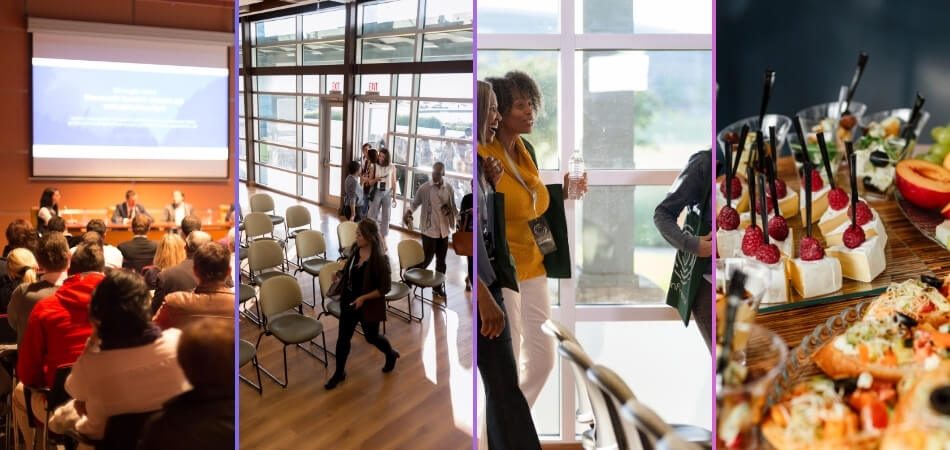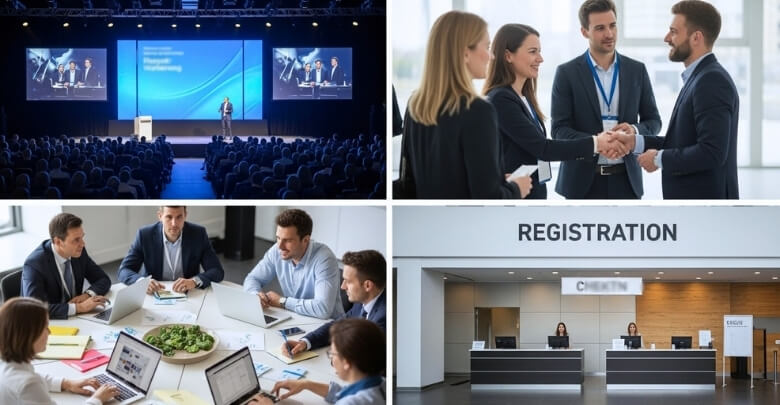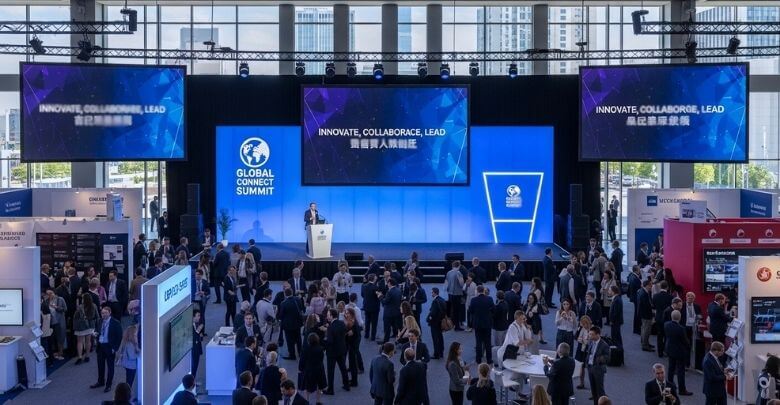Conferences bring people together to share ideas, learn, and connect. They are often seen as places full of energy and learning, where knowledge and networking meet. Many might even wonder what makes them truly work well, or even think, what are the 4 features of a successful conference?
The four features of a successful conference are engaging content and speakers, smooth logistics and venue setup, valuable networking opportunities, and a clear purpose with attendee satisfaction. Together, these elements create a strong learning, connection, and experience-driven event.
Do you want to know how these features actually work in real conferences and how organizers make sure they are delivered properly? Keep reading this article, because here you will find every detail that explains the complete picture in simple and clear words.
What are the 4 Features of a Successful Conference?
A good conference is not just about gathering people in one place. It is about creating an experience that feels useful, comfortable, and enjoyable for everyone who attends. To make this happen, there are a few important features that stand out. Let’s look at them one by one.

1. Engaging Content and Speakers
Strong content is the foundation of any successful event. People attend because they want to learn something useful, so the sessions should focus on timely, relevant, and practical topics. Sharing real-life case studies, industry updates, and hands-on strategies gives attendees knowledge they can use right away.
Speakers matter just as much as the topics. A good speaker captures attention with confidence, clear explanations, and stories that connect with the audience. Instead of only presenting slides, they can make the session interactive with Q&A, group discussions, or short activities. Workshops and panel talks with different viewpoints also add variety and keep the audience engaged.
When the content is valuable and the speakers know how to connect, attendees leave with knowledge they will remember and apply.
2. Smooth Logistics and a Suitable Venue
An event may have the best content, but if the logistics are poor, the overall experience suffers. The venue should be easy to reach, comfortable, and fully equipped with reliable facilities like proper seating, lighting, internet, and food services.
Technical support is critical as well. Clear audio, sharp visuals, and a stable internet connection ensure that sessions flow without interruptions. Registration should be simple, signs should guide attendees clearly, and staff should be available to assist whenever needed.
This is why many large-scale events, especially global events like an international conference in Canada, the USA, or any other country, pay close attention to smooth logistics and venue selection. When everything runs efficiently, participants can focus on learning and networking without distractions.
3. Valuable Networking Opportunities
Conferences are not only about listening; they are also about connecting. Meeting new people, exchanging ideas, and building professional relationships are major reasons why people attend.
Well-planned events include networking breaks, social mixers, or group sessions where participants can interact naturally. Tools like name badges, mobile networking apps, or themed discussion tables make it easier to strike up conversations. A friendly and welcoming environment encourages people to share openly and build long-term connections.
These networking chances often lead to collaborations, new projects, and lasting professional growth, which adds great value to the event.
4. Clear Purpose and Attendee Satisfaction
Every successful conference is guided by a clear purpose. It could be to share research, update professionals about industry trends, or encourage innovation. A well-defined goal helps attendees know what to expect and ensures the program stays on track.
Attendee satisfaction is the final marker of success. People should leave with new knowledge, useful contacts, and a positive experience. Collecting feedback after the event is essential to understanding what worked well and where improvements can be made. Over time, this process of refining and improving makes future events even stronger.
When attendees feel their time and investment were worthwhile, they are more likely to return and recommend the event to others.
A successful conference is built on planning, meaningful content, smooth organization, and creating chances for people to connect. When all these features come together, it leaves a lasting impact on everyone who attends.
How Do Organizers Ensure the 4 Features of a Successful Conference?
Conferences run smoothly only when every part is well planned. Behind the scenes, organizers work step by step to cover all important areas that make the event effective. Let’s look at how they make sure all features are handled well.
Clear Objectives
Organizers begin by identifying conference objectives, which helps them design the event structure, select the right speakers, and plan activities that align with the audience’s needs. This step gives the entire event direction and purpose. Without clear goals, the planning can lose focus and fail to deliver the right impact.
Engaging Content
Once the goals are set, planners focus on creating content that will keep the audience interested. They invite knowledgeable speakers, arrange useful sessions, and make space for interactive discussions. By balancing information with engagement, they ensure people leave with valuable takeaways.
Smooth Logistics
Good content alone is not enough if the event setup is poor. Organizers carefully manage logistics like seating, lighting, sound systems, and registration. They also plan schedules in a way that avoids confusion. This attention to detail makes the whole event feel professional and organized.
Audience Experience
The audience’s comfort and involvement are a top priority. Planners provide clear communication before and during the event, make sure breaks are well timed, and arrange networking opportunities. When the audience feels included and valued, they are more likely to enjoy and benefit from the conference.
Effective Follow-up
After the event ends, the work continues. Organizers collect feedback, share recordings or notes, and sometimes provide certificates. These steps help attendees remember the key lessons and also give planners ideas to improve future events.
A successful conference is never an accident. It takes clear goals, strong content, smooth planning, care for the audience, and proper follow-up. When all these features come together, the event becomes both memorable and meaningful.
What Challenges Can Affect the 4 Features of a Successful Conference?
Strong planning, promotion, engagement, and accessibility are all essential for a successful conference. But sometimes, common problems can get in the way and affect these key features. Let’s look at what challenges might cause issues in each area.
Poor Planning
Without a proper plan, even the best ideas can fail. Poor planning often leads to confusion about schedules, missing resources, and last-minute stress. When roles are not clear and tasks are left unfinished, it creates a weak foundation that affects the whole event. To avoid such issues, it helps to think carefully about conference details in advance so everything runs smoothly from start to finish.
Weak Promotion
If people don’t know about the conference, they won’t attend. Weak promotion happens when organizers depend only on limited methods, such as a few emails or posts. Without strong outreach through social media, partnerships, or ads, the event may have very low attendance.
Low Engagement
A conference can feel flat if attendees don’t feel involved. Low engagement often comes from boring presentations, no interactive sessions, or a lack of networking chances. If people only listen without chances to connect, they may lose interest quickly.
Lack of Accessibility
When a conference is hard to join, it leaves people out. Accessibility issues can include no ramps for disabled guests, no captions for online sessions, or high ticket costs. These barriers stop many people from enjoying and learning from the event.
Budget Problems
Money issues can affect every part of the conference. A tight budget can lead to poor-quality equipment, limited food options, or fewer guest speakers. When funds are not managed well, the overall experience may suffer and disappoint the audience.
Challenges are common, but with careful planning and smart decisions, they can be avoided. When organizers focus on these problem areas early, the chances of hosting a successful and memorable conference become much higher.
How Can Technology Improve the 4 Features of a Successful Conference?
Technology has changed how events are planned and experienced. From registration to networking, digital tools bring ease and efficiency. They make it possible to connect people in new ways. Here are some useful tips on how technology makes conferences better.
- Virtual Platforms: Online platforms allow people to join from anywhere, making conferences more flexible. They also let organizers reach a wider audience without needing large physical spaces.
- Event Apps: Mobile apps provide schedules, speaker details, and live updates. Attendees can also use them to ask questions and stay connected during sessions.
- Digital Registration: Online registration saves time and reduces paperwork. It also helps organizers keep track of attendees and provide quick check-ins at the venue.
- Live Streaming: Hybrid setups allow sessions to be streamed online for remote participants. This ensures people who cannot attend in person still benefit.
- Networking Tools: Apps and online platforms create spaces for attendees to connect with each other. They can chat, share contacts, and plan meetings easily.
- Feedback Systems: Digital surveys and polls help collect opinions quickly. This gives organizers instant insight into what went well and what needs improvement.
- Smart Engagement: Tools like live polls, quizzes, and interactive boards keep the audience active. This helps sessions stay interesting and not one-sided.
Technology adds strength to every part of a conference. It makes planning easier, connections smoother, and sessions more engaging. By blending digital tools with traditional setups, organizers can deliver events that are both efficient and impactful.
How Can Management Practices Strengthen the 4 Features of a Successful Conference?
Good management plays a big role in making any conference run smoothly. It helps connect plans with actions, making sure every detail is covered. When management is strong, the event feels well-organized. Let’s explore how this can happen.
Clear Planning
Strong management ensures that every part of the event has a clear plan. Schedules are set in advance, tasks are assigned properly, and backup solutions are ready. This prevents last-minute issues and gives confidence that everything is under control during the conference.
Smart Promotion
Good management makes sure promotion is wide and effective. Instead of relying on only one channel, it uses many ways such as social media, partnerships, and local outreach. This balanced effort helps the conference reach more people and boosts overall attendance, which is one of the key conference characteristics that define a successful event.
Active Engagement
Well-managed conferences keep the audience involved through interactive sessions, feedback opportunities, and networking time. Speakers are guided to make sessions lively and engaging. When participants feel included and valued, their interest grows, and the overall experience becomes much more rewarding.
Strong Accessibility
Management practices also focus on making the event open to everyone. This can include arranging ramps, offering captions, or providing affordable options. Effective conference procedures give structure to management tasks, ensuring every feature is delivered without gaps for attendees.
Budget Control
Handling money wisely is another way management strengthens the event. By balancing costs and prioritizing what matters most, they avoid overspending while keeping quality high. Careful budget control ensures that participants enjoy a professional, well-prepared conference without unnecessary cutbacks.
Management practices shape how well a conference performs. With planning, promotion, engagement, accessibility, and budgeting handled properly, the chances of success increase greatly. It all comes down to staying organized and focusing on the right details.
Can a Conference Still Be Successful Without All 4 Features?
Every conference is built on a few important features that make it strong and memorable. But sometimes, not all of them come together perfectly. The big question is whether missing one feature can still mean success. Let’s find out more.
Importance of Balance
All four features matter, but balance plays the main role. If one part is weak but the others are strong, the event can still feel successful. For example, strong engagement and accessibility might make up for limited promotion in some cases.
Planning Gaps
Even with great speakers and strong promotion, poor planning can cause big issues. Delays, confusion, or missing details can frustrate participants. A conference may still run, but its overall quality drops when planning is not fully managed well.
Promotion Weakness
A well-planned and engaging conference may still succeed with fewer people if promotion is weak. The event might not reach a large audience, but those who attend can still enjoy it. Success then feels limited but not completely lost.
Accessibility Issues
If accessibility is ignored, many people may be left out. Even with good planning and promotion, some may not get the chance to attend. The event might feel successful to those present, but it misses the wider purpose of inclusiveness.
Overall Connection
The four features work best together in the end. Missing one does not always mean failure, but it reduces the impact. A truly successful conference comes when all features support each other, creating a complete and balanced experience.
A conference can still be good if one feature is weaker, but the overall success depends on how well the other parts make up for it. When all four features are strong, the results are always far better.
FAQs About What are the 4 Features of a Successful Conference?
Successful conferences depend on many details working together. People often have questions about what really makes these events effective and memorable. Here are some common questions with clear answers to help explain the main points in simple words.
Why is Attendee Feedback Important for a Conference?
Attendee feedback is important because it shows what worked well and what needs improvement. Organizers use it to make future events stronger and more enjoyable. It also helps participants feel valued, as their opinions shape future planning. Over time, this feedback improves the quality of conferences.
How Do Breaks Improve Conference Experience?
Breaks give people time to relax, recharge, and connect with others. Without them, attendees may feel tired and lose focus during sessions. Short breaks also create natural chances for networking and small conversations. This makes the conference feel more balanced and refreshing.
What Role Do Volunteers Play in a Conference?
Volunteers help with many important tasks like registration, guiding attendees, and solving small issues. Their support ensures smooth management and quick problem-solving. They also add a welcoming touch by assisting participants throughout the event. Without volunteers, many details would be harder to handle.
How Can Food Services Affect Conference Success?
Food services have a direct impact on attendee satisfaction. Poor-quality meals or long waiting lines can frustrate participants. On the other hand, good catering keeps people energized and happy. Providing varied and accessible options ensures everyone feels comfortable and cared for.
Why Is Timing Important in a Conference Schedule?
Proper timing keeps the event organized and stress-free. Sessions that run too long can make people lose interest quickly. A balanced schedule allows learning, discussions, and networking. When timing is managed well, the entire program feels smooth and enjoyable.
How Do Social Events Add Value to a Conference?
Social events create relaxed spaces for people to connect outside of formal sessions. These activities encourage networking and friendly conversations. They also make the conference more memorable by mixing learning with fun. Strong social interactions often lead to long-lasting professional relationships.
What Is the Role of Sponsors in a Conference?
Sponsors provide financial support and resources that make conferences possible. They often help with venue costs, technology, or event materials. Sponsors also add credibility by linking their names with the event. Their contribution improves the overall quality and reach of the conference.
How Can Signage Improve Attendee Experience?
Clear signage helps people move around the venue without confusion. It shows directions to rooms, rest areas, and important facilities. When signs are missing, attendees may feel lost or stressed. Good signage makes the environment user-friendly and boosts confidence in the event.
Why Should Conferences Include Interactive Sessions?
Interactive sessions keep participants involved instead of just listening. Activities like Q&A, group talks, or polls make learning more active. This approach helps people remember ideas better and enjoy the process. A conference feels more lively when attendees get a chance to participate.
How Do Cultural Elements Improve International Conferences?
Including cultural elements like local art, music, or traditions creates a welcoming atmosphere. It helps visitors feel connected to the host country. These touches also make the event unique and memorable. Cultural sharing adds richness beyond the main content of the sessions.
Conclusion
A successful conference comes from blending strong planning, engaging content, smooth logistics, and good networking. Missing one part may weaken the impact, but together, they shape the event’s value. In short, this is the clear answer to what are the 4 features of a successful conference?
To make any conference memorable, organizers should focus on clear goals, practical content, proper budgeting, and ensuring accessibility for all. Paying attention to details always improves results. With that in mind, I wish you success in planning or attending your next event.








